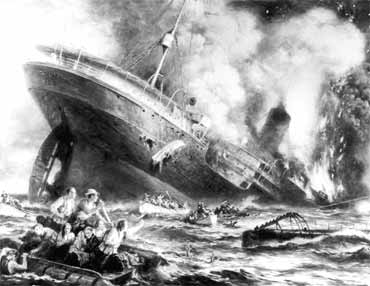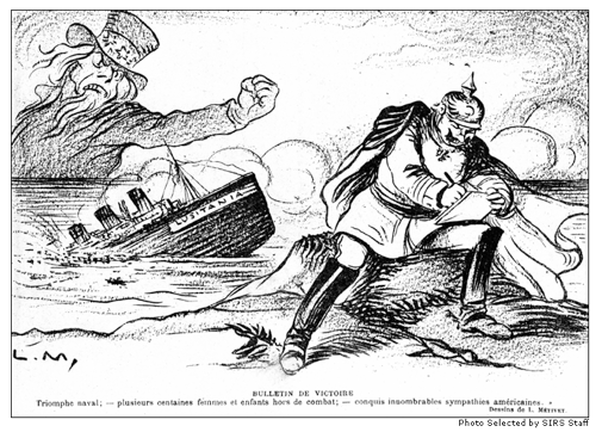Lusitania Sinking Forces Wilson to Ponder Joining Allies
The President’s Advisers Are Split
Special to The Great War Project
(1-3 June) Ever since the sinking of the British ocean liner Lusitania on May 7th by a German submarine off the south coast of Ireland, the American President Woodrow Wilson is struggling with how to respond.
After all, 128 Americans died in the U-boat attack.All told nearly 1200 passengers and crew were killed.
The Germans assert that all ships are legitimate targets – military or merchant, belligerent or neutral. It’s been unrestricted warface on the sea since Germany announced its intentions in early 1915.
Wilson tries to steer the United States on a neutral course. But neutrality means different things to different nations. Wilson believes neutrality should permit the non-belligerent nations – the US above all — to sell munitions, and lend money, to the belligerent nations, especially to Britain.
Germany, to say the least, does not look favorably on this policy.
The issue comes to a head in May after the Lusitania disaster. Wilson’s advisers are split, with Councilor Robert Lansing, number two at the State Department, an energetic advocate for this policy.
However, in a cabinet meeting, the Secretary of State, William Jennings Bryan, argues that this stance is not sustainable.
“You people are not neutral,” Bryan argues. “You are taking sides.”
According to the account of one cabinet member who is present, Wilson replies “in a voice that was sharp and cold…Mr. Secretary, you have no right to make that statement. We are all honestly trying to be neutral against heavy difficulties.”
Since the Lusitania was attacked, there has been an exchange of diplomatic notes between the United States and Imperial Germany. Wilson’s notes have been critical but not confrontational. Wilson asserts that Germany has no right to attack neutral ships, especially those carrying Americans.
Wilson wants to stop the submarine war altogether.
The Germans fear that the Lusitania incident might draw the US into the war on the allied side. (That is certainly what Winston Churchill and other British leaders hope for.) As a result in early June, after a long struggle within the German leadership, the German Emperor orders that “no large liner, not even an enemy one, will be sunk until further orders.”
Wilson’s notes, according to his biographer Arthur Link, have been “firm but unwarlike diplomacy.” By this successful negotiating, Link writes, “the President of the United States had won respect for American and neutral shipping and safety to large passenger liners in the war zone.”
Still, the Germans are evasive. Their response is not as clear and as certain as Wilson desires.
“Peace between Germany and the United States was now at least possible,” Link writes, “but the great objective upon which Wilson had set his heart, the entire abandonment of the submarine war, still remained to be achieved.”
Many across the United States see it another way. They are not satisfied with the stance that Germany has taken.
The lack of trust between the US and Germany remains, and it is spreading.
In developments on the battlefields a century ago, the outlook for the Allies is bleak.
The stalemate on the Western Front continues, with British troops running out of ammunition. On the Eastern Front, the Russians are losing more territory that they seized from Austria earlier in 1915. The Ottoman government is still murdering Armenian civilians.
The fight for the Gallipoli peninsula in western Turkey is also deadlocked, with the Turkish forces maintaining an unexpected advantage over the British.
And now the war is spreading to the Middle East. A new battle is shaping up in the Ottoman province of Mesopotamia – that territory known today, a century later, as Iraq.


